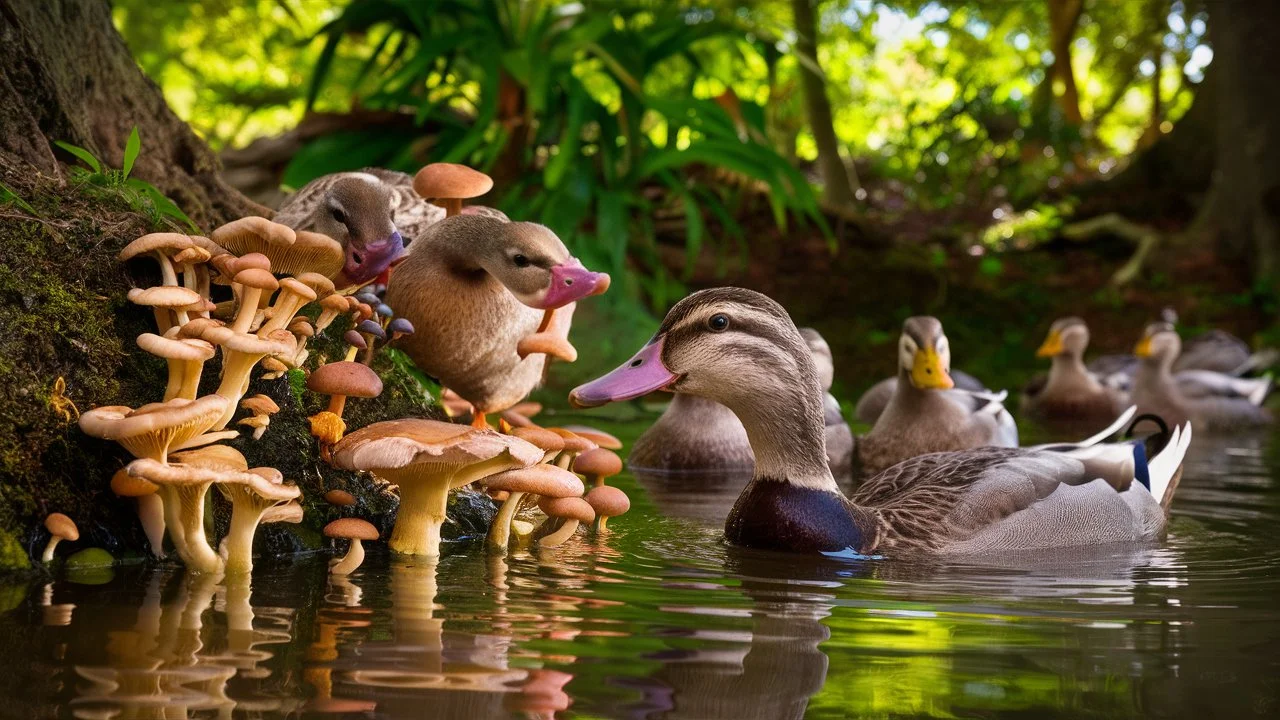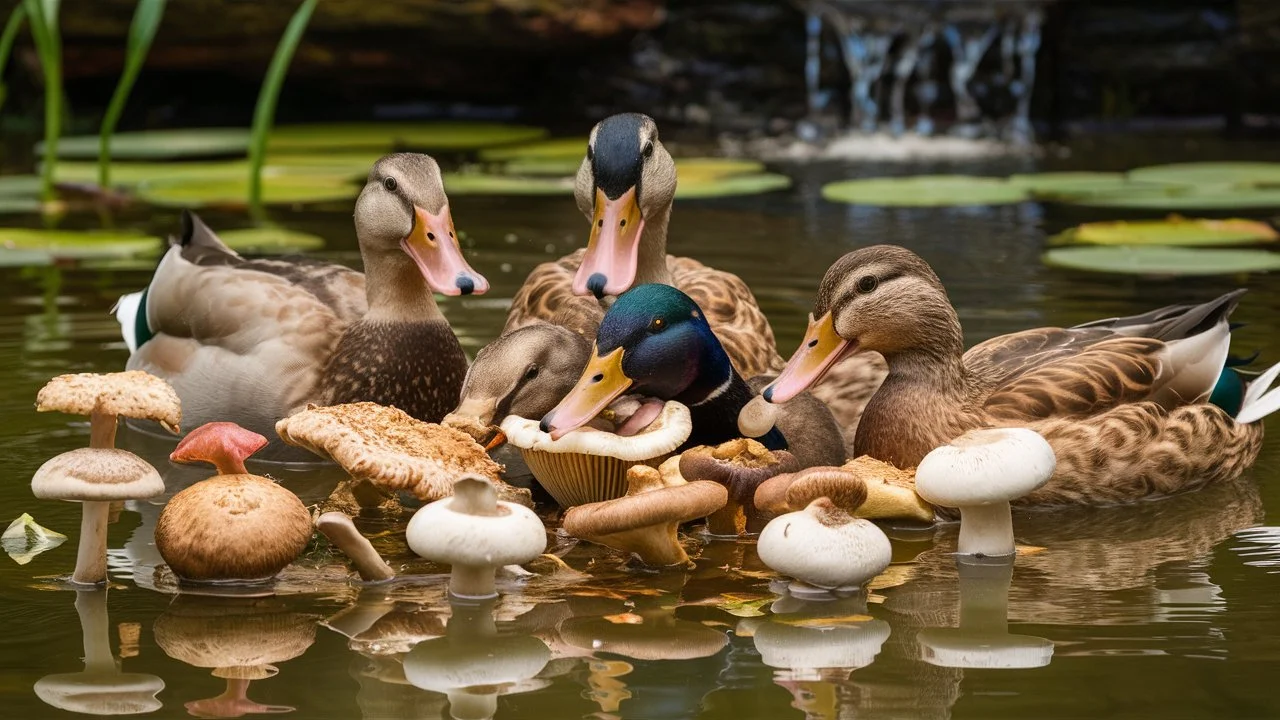Ducks are interesting and fun to watch, especially when they are eating. They have a varied diet and eat many different types of food in the wild. Ducks often eat plants, small fish, insects, and more. But can ducks eat mushrooms? This is a good question because some mushrooms are safe to eat, while others can be dangerous. Let’s explore if ducks can eat mushrooms, the benefits they might get, and the risks involved.
Yes, ducks can eat certain types of mushrooms, such as white button mushrooms, which are safe and non-toxic. However, it’s important to avoid wild mushrooms, as some can be toxic and harmful to ducks. Always ensure the mushrooms are fresh, clean, and preferably cooked to aid digestion and avoid potential health risks.
What Do Ducks Normally Eat?
Before we talk about mushrooms, it’s important to know what ducks usually eat. Ducks are omnivores, which means they eat both plants and animals.
Here are some common foods that ducks eat:
- Aquatic Plants: Ducks love to eat plants that grow in water like algae and duckweed.
- Small Fish and Insects: Ducks often catch small fish and insects for extra protein.
- Grains and Seeds: Ducks eat grains and seeds they find near lakes and ponds.
- Fruits and Vegetables: Ducks enjoy a variety of fruits and vegetables, which give them important vitamins and minerals.
Can Ducks Eat Mushrooms?
Yes, ducks can eat mushrooms but there are some important things to consider. Not all mushrooms are safe for ducks. Some mushrooms can be very toxic and can make ducks sick or even cause death. Therefore, it’s crucial to know which mushrooms are safe and which ones are dangerous.
Related reading: Can Ducks Eat Cheerios?

Safe Mushrooms for Ducks
There are many types of mushrooms that are safe for ducks to eat. Some common safe mushrooms include:
- Button Mushrooms: These are the small, white mushrooms often found in grocery stores. They are safe for ducks to eat.
- Portobello Mushrooms: These are larger and also safe for ducks.
- Shiitake Mushrooms: These mushrooms are often used in cooking and are safe for ducks.
These mushrooms can provide ducks with some nutrients and variety in their diet.
Benefits of Feeding Safe Mushrooms to Ducks
Feeding safe mushrooms to ducks can have several benefits:
- Nutritional Value: Mushrooms can provide vitamins and minerals like Vitamin B and selenium.
- Variety in Diet: Adding mushrooms can give ducks a varied diet, which can be more interesting and enjoyable for them.
- Natural Foraging: In the wild, ducks might come across mushrooms, so it can be a natural part of their foraging behavior.
Risks of Feeding Mushrooms to Ducks
While some mushrooms are safe, others are very dangerous. Here are some risks to be aware of:
- Toxic Mushrooms: Some mushrooms contain toxins that can be harmful or deadly to ducks. Examples of toxic mushrooms include:
- Amanita Mushrooms: These can be very dangerous and should be avoided.
- Death Cap Mushrooms: As the name suggests, these are extremely toxic and can be fatal.
- Destroying Angel Mushrooms: These are also highly poisonous.
- Difficulty Identifying Mushrooms: It can be hard to tell which mushrooms are safe and which are not. Some toxic mushrooms look very similar to safe ones.
- Health Risks: Eating toxic mushrooms can cause symptoms like vomiting, diarrhea, and in severe cases, liver failure or death.
How to Safely Feed Mushrooms to Ducks?
If you want to feed mushrooms to ducks, it is important to follow some safety guidelines:
- Only Use Store-Bought Mushrooms: These are the safest because they are identified and tested for safety. Avoid wild mushrooms unless you are an expert in mushroom identification.
- Cook the Mushrooms: Cooking can help break down any potential toxins and make the mushrooms easier for ducks to digest. Avoid adding any seasonings, salt, or butter.
- Introduce Gradually: Start with small amounts to make sure the ducks tolerate them well. Watch for any signs of illness or discomfort.
- Mix with Other Foods: Offer mushrooms as part of a balanced diet, mixed with other safe foods like grains, vegetables, and fruits.
Observing Ducks After Feeding Mushrooms
After feeding mushrooms to ducks, it is important to observe them for any signs of health problems. Watch for:
- Changes in Behavior: If ducks seem lethargic, weak, or unusually quiet, this could be a sign of a problem.
- Digestive Issues: Look out for vomiting, diarrhea, or changes in eating habits.
- Physical Symptoms: Check for any physical changes like swelling, discoloration, or unusual droppings.
If you notice any of these signs, stop feeding the mushrooms immediately and consult a veterinarian who specializes in birds.
Can Ducks Eat White Mushrooms?
Yes, ducks can eat white mushrooms. White mushrooms are safe for ducks to eat and can be a healthy addition to their diet when given in moderation. Here are some reasons why white mushrooms are a good choice for ducks:
- Safe and Non-Toxic: White mushrooms are non-toxic and safe for ducks to eat. Unlike some wild mushrooms, they do not contain harmful toxins.
- Nutritional Benefits: As mentioned earlier, white mushrooms are rich in vitamins, minerals, and antioxidants that can benefit ducks’ health.
- Easy to Digest: Ducks can easily digest white mushrooms, especially when they are cooked.
How to Feed White Mushrooms to Ducks?
To ensure that white mushrooms are a healthy and safe part of a duck’s diet, follow these guidelines:
- Wash Thoroughly: Always wash mushrooms thoroughly to remove any dirt or pesticides.
- Cook the Mushrooms: While ducks can eat raw mushrooms, cooking them can make them easier to digest. Avoid using any seasonings, salt, or butter.
- Cut into Small Pieces: Cut the mushrooms into small, manageable pieces to make it easier for ducks to eat.
- Introduce Gradually: Start by giving a small amount to see how the ducks react. Monitor them for any signs of discomfort or illness.
- Mix with Other Foods: Incorporate white mushrooms into a balanced diet that includes grains, vegetables, and other safe foods.
Observing Ducks After Feeding
After feeding white mushrooms to ducks, it’s important to observe them for any signs of health issues. Look out for:
- Changes in Behavior: If ducks become lethargic, weak, or unusually quiet, it could indicate a problem.
- Digestive Issues: Watch for vomiting, diarrhea, or changes in eating habits.
- Physical Symptoms: Check for any physical changes like swelling, discoloration, or unusual droppings.
If you notice any of these signs, stop feeding the mushrooms and consult a veterinarian who specializes in birds.
Benefits of Feeding White Mushrooms to Ducks
Feeding white mushrooms to ducks can have several benefits:
- Improved Nutrition: Adding white mushrooms to a duck’s diet can provide additional vitamins and minerals that support overall health.
- Variety in Diet: Offering different types of food can make a duck’s diet more interesting and enjoyable.
- Natural Foraging: In the wild, ducks may come across mushrooms as part of their natural foraging behavior, so it can be a natural addition to their diet.
Risks of Feeding White Mushrooms to Ducks
While white mushrooms are generally safe, there are a few risks to be aware of:
- Overfeeding: Feeding too many mushrooms can upset a duck’s digestive system. It’s important to offer them in moderation.
- Contamination: Mushrooms that are not properly washed or are contaminated with pesticides can be harmful. Always ensure they are clean and fresh.
Conclusion
In conclusion, ducks can eat mushrooms, but it is crucial to be very careful about which mushrooms you offer. Stick to safe, store-bought varieties like button, portobello, and shiitake mushrooms. Always cook the mushrooms and introduce them gradually to the ducks’ diet. Never feed wild mushrooms unless you are absolutely sure they are safe, as many wild mushrooms can be toxic and dangerous. By following these guidelines, you can add mushrooms to a duck’s diet safely and enjoy watching them explore new foods.
Remember, the safety and health of ducks are the most important considerations when introducing any new food to their diet. Always observe them closely and be ready to act if you notice any signs of trouble. This careful approach will help ensure that the ducks stay healthy and happy while enjoying a varied and interesting diet.

